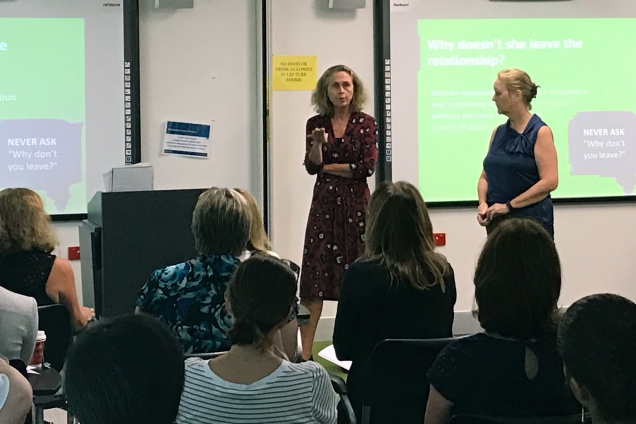
More than 60 frontline Gold Coast Health staff have this week attended advanced domestic violence training aimed at supporting staff right across the health service to recognise and respond victims of violence.
After appointing the state’s first specialist and dedicated Domestic and Family Violence Coordinator in late 2016, Gold Coast Health is now rolling out Queensland Health train-the-trainer workshops targeting frontline clinicians working in key areas like maternity services, mental health, the emergency department, paediatrics, sexual assault services and our community services.
Kym Tighe, Gold Coast Health’s Domestic and Family Violence Coordinator, this week led training for 32 clinicians at Gold Coast University Hospital and a further 30 clinicians based at Robina Hospital.
“We are often a first point of contact for people who have experienced violence, so our clinicians working on the front line must have an understanding of and know how to respond to a disclosure of domestic and family violence,” Ms Tighe said.
“We’re aiming to train all of our frontline workers to identify, support and refer women who wish to escape the cycle of violence to the most appropriate local services.”
Here on the Gold Coast, clinicians working in the Gold Coast University and Robina hospitals had seen at least a 45% increase in the number of patients presenting to the emergency departments who identified as victims of domestic and family violence in the two years to July 2016.
In 2014 Gold Coast Health social workers assisted 593 patients, in 2015 the number of domestic and family violence referrals increased to 868, and in the first six months of 2016 there were 426 referrals.
Ms Tighe was joined by Midwifery and Nursing Education Director, Women and Newborn Services, Dr Kathleen Baird – a joint appointment with Griffith University – to deliver the training.
“We expect that the clinicians who’ve attended the training will take a lead in their own clinical areas and be responsible for training more staff in this important work,” Dr Baird said.
“We already have experienced social workers in many areas of Gold Coast Health including in our emergency and maternity departments, so this training will help more of our clinical staff to support local people presenting to our service as victims of domestic and family violence.”
Both Dr Baird and Ms Tighe were part of the Queensland Health Domestic and Family Violence Expert Advisory Board and provided input into the development of a Queensland Health toolkit and this train-the-trainer program currently being offered to clinicians at every health service across Queensland.
Gold Coast Health works collaboratively with local domestic and family violence agencies, community groups, Queensland Police and the Domestic Violence Magistrates Court as part of the Domestic and Family Violence Interagency Reponses (DVIR) framework. The successful interagency framework is being duplicated in other parts of Queensland and across Australia.



